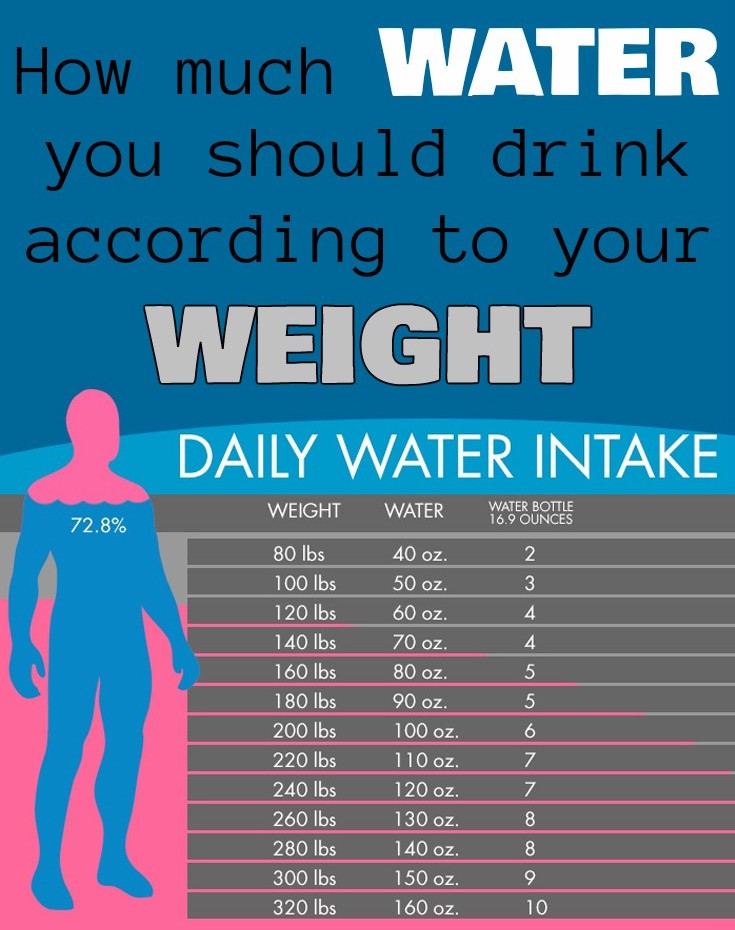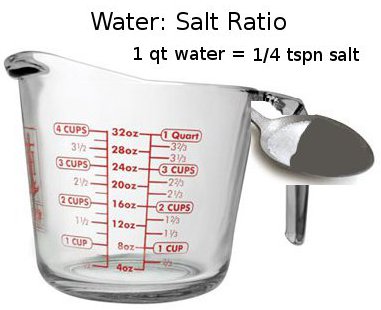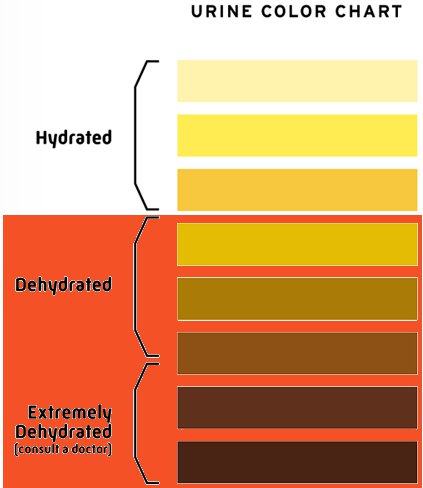
How much water should you drink?
The water you drink should be separate from juices and everything else that you may drink. Average person really needs about four quarts ( 1 quart = 946.353 ml) of water a day.
To determine how much water you need each day, divide your body weight in half. The answer is the approximate number of water ounces you should drink daily. You should drink half of your body weight in ounces. If you weight 200 pounds, you should drink 100 ounces water [ 3.13 quarts, 2.98 liters or about 10-12 cups (size 8-ounces) of water a day ]. If you weigh closer to 100 pounds you will need only about 50 ounces of water or about four 12-ounce glasses daily.
Be aware that you will urinate more often when you drink more water and that this is a normal body reaction. Key question for you: Do you have a normal working kidney and bladder that can excrete as much urine as you drink water?
SALT: Salt is good for you.
Kendrick: salt is good 2014
McCallum: less chloride more mortality 2013
Silverman: More salt is good 2014
Salt regulates the amount of water that is held inside the cells. Salt also regulates the amount of water that is held outside the cells. The body needs salt to compensate for the natural losses in urine, respiration and perspiration. Salt also provides the minerals needed to make neuro-electricity. Salt needs to be balanced out by potassium and magnesium. Salt regulates sleep and many body functions like clearing the mucus in lungs, preventing muscle cramps, making strong bones, preventing varicose veins and much more.
The best salt to use is sea salt. Sea salt has 80 minerals that the body needs but which refined-bleached-white table salt lacks.
Table salt is refined and is not the same as sea salt. Many years ago table salt referred to as iodized in that the refined salt grains were sprayed with iodine. The iodine in salt was a way of providing just enough iodine to prevent goiter. However, this process has been discontinued. Table salt is has been refined and the natural minerals have been removed.

⇧ Water : salt Ratio.
As a rough rule, you need about half a teaspoon of salt for every 10 glasses of water or a quarter teaspoon per quart of water. Take salt throughout the day. Warning: Observe the rule of thumb amount of salt per day. Make sure to drink enough water to wash the excess salt out of the body.
Controversy: According to World Health organization [WHO] Report of 2014, excess consumption of dietary sodium is associated with increased risk of hypertension and cardiovascular disease. It has been estimated that excess sodium intake was responsible for 1.7 million deaths from cardiovascular causes globally in 2010. The main dietary source of sodium worldwide is salt. However, sodium can be found in other forms, and the main source of dietary sodium consumption depends on the cultural context and dietary habits of the population. In many countries processed foods are the main source of sodium. WHO neglected to mention that salt is essential for human health. WHO: Salt & health 2014
WHO report neglected the latest report about salt consumption, published in JAMA, the Journal of the American Medial Association (Report click here) [ May 4, 2011. Vol. 305, N. 17 ]: "The report tried to prove that dietary low salt heart attack risk increased by 500%. The study made headlines when it reported that low salt intake actually increases the risk of dying from heart attack. The study looked at over 3600 patients for almost 8 years. It made major headlines. The researchers found that, the less salt the test subjects took in, the more deaths related to heart and vascular problems. The opposite was also true. The more salt the patients took in, the lower the heart attack and vascular problem rates. In fact, says Jan A. Staessen, M.D., the senior author of the study and the head of the hypertension laboratory at the University of Leuven, in Belgium, the findings "do not support the current recommendations of a generalized and indiscriminate reduction of [sodium] intake at the population level." Garnder: Low salt diet causes heart attack 2011.
Blood tests do not show dehydration
Urine color: Urine color is a better indicator than blood tests are of dehydration. You drink enough water when your urine is colorless; colorless urine is a good sign you are drinking enough water for that day. When the urine becomes yellow, it means that the body is beginning to become dehydrated and when it becomes orange, then the body is truly dehydrated and some part of the body is suffering from dehydration. We can also monitor dehydration by the texture of the skin; if the skin is nice and loose and smooth, then we are hydrated. If it becomes creasy and shriveled, it means dehydration. The crow's feet on the face of elderly people is usually a sign of dehydration. The turkey neck under the chin is also a sign of dehydration.

⇩Crow's Feet
⇳Turkey Neck is a sign of dehydration.
Video: Dr Batmanghelidj about water, salt, pain, disease and healing View timing is 2:10 hours: (Click Here)
Controversy about salt: 37:13 mins. Table salt, Celtic salt vs Himalayan salt; [all salt retains water]:
Thank you for your patience and reading this far. Your reward, besides drinking more good healing water and a pinch of salt, is to watch the fun video click here.
Conclusion:
This author reviewed the scientific explanations and claims made by Batmanghelidj and searched for supporting evidence from other scientists. Is there any validity in the arguments put forth by Batmanghelidj that water can heal? Indeed, there is a lot of scientific truth that water can heal and restore many sick and feeling bad persons to good health. He not only listed all the benefits of the right amount of water and unrefined sea salt, but also suggested other minerals, enzymes, hour-long walks twelve hours apart, sunlight, wholesome food and other good things as part of the healing process. The water cure theory makes a lot of sense!
There are a lot of commercially vested articles on the internet about the benefits of water but these commercialized articles offer no research evidence to support their claims. This article provides much of the missing evidence to support that water can heal and help to lose weight. You should consult your medical doctor when drinking water to lose weight or to alleviate health problems.
Most important, on't wait to drink until you get thirsty, because that's an error. Unfortunately, the National Academy of Sciences and some other people recently have been telling people to wait until they get thirsty before they drink. Adams: Batmanghelidj interview water is another example of controversy about water and salt.
Apparently, one needs to drink a lot of water at the proper time, with a pinch of sea salt, for water to act as a healer. The body heals all diseases at same time. The body heals everything! But .... it needs adequate amount of nutrients to do so; including lots of water as well as good nutrition, sunlight and exercise.
Be Water-dehyrated Aware! It is easy to understand what water does in your body, but bear in mind there is more to it than just simply drinking water. You must learn to rehydrate your body gradually and carefully. Drinking an excess of water can flush out the electrolytes that your body needs.
You need to recognize your own particular early indicators of thirst. Not everyone is the same. You must learn what can happen to your own body when it becomes dehydrated. Not every body registers drought in the same way or in a common location. Depending on where the drought has settled, the initial indicators are different in different people. "You are not sick. You are thirsty. Don’t treat thirst with medications."
Water healing controversy: Water is also touted by many as a healer and cure. Medical doctor, Fereydoon Batmanghelidj, has stated that he has prescribed water and salt to sick and diseased persons for over 30 years and successfully alleviated inflammation, pain and many diseases. In spite of such claims being dismissed by US Federal Drug Administration, The Institutes of Health, National Academy of Sciences and most medical doctors, there are many practitioners and persons who believe that water can heal and cure. The controversy has been silently heating up since 1990.
Hall: deception about water cure 2010
Muckelbauer: Review water intake & weight 2013
Batmanghelidj professes that the American Medical Association and the National Institutes of Health have rejected the idea that water can heal and cure. "They refuse to study the medicinal effects of water in place of the drugs they routinely push their members or followers to use." There is a lot of hypocrisy in the medical and public health field and one of these is not acknowledging that water and salt do work while at the same time, using saline solution IVs in Hospital emergency wards. That is, high levels of water and salt solution to keep their patients alive in a hospital but denying that water can heal and prevent illnesses and diseases!
A major critique of Batmanghelidj's book: Your Body's Many Cries for Water is his writing style. While he does a super job of simplifying the complex chemistry and physiology information for readers, he mixes good scientific information with his views about the practitioners pushing drugs by criticizing medical, drug and government establishments. His writing style does not always give or specify supporting references for scientific data. All of his documentation is listed at the end of the book. Collectively, the book is easy to read and understand, but cumbersome in supporting the science of his water claims. However, Batmanghelidj's writing style does not belittle the validity of the information about water. His theory of water cures is plain common sense. You should read one of his books and judge for yourself about water as a healer! Maybe you can save yourself a lot of money avoiding prescription drugs!


No comments:
Post a Comment